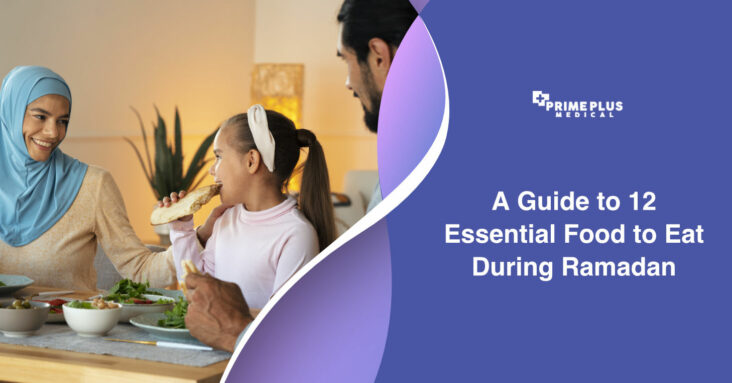Discover the essential food to eat during Ramadan, ensuring you maintain optimal nutrition and energy levels throughout this holy month. From nourishing dates to protein-rich lentils, our guide explores the diverse array of traditional and nutritious options to include in your suhoor and iftar meals. Whether you’re seeking sustenance or seeking spiritual fulfillment, these Ramadan-friendly foods will support your well-being and enhance your fasting experience.

12 Food to Eat During Ramadan
Dates – Nature’s Sweetener
Begin your iftar with dates, a tradition embraced by Prophet Muhammad. Not only are dates a natural sweetener, but they also provide a quick energy boost due to their high sugar content. Their natural sugars help replenish low blood sugar levels after fasting.
Water – The Elixir of Life
The second food to eat during ramadan is staying hydrated. Consume at least 8 glasses of water between iftar and suhoor to prevent dehydration. Water is essential for digestion, nutrient absorption, and overall well-being.
Lentils and Legumes – Protein Powerhouse
Incorporate lentils and legumes into your meals to ensure an adequate protein intake. These plant-based sources are not only rich in protein but also high in fiber, promoting a feeling of fullness and aiding in digestion.
Whole Grains – Sustaining Energy Levels
Opt for whole grains like brown rice, quinoa, and whole wheat bread to sustain energy levels throughout the day. These complex carbohydrates release energy slowly, providing a steady source of fuel during fasting hours.
Yogurt – Probiotic Boost
Yogurt is an excellent source of probiotics that support gut health for food to eat during Ramadan. Enjoy it as a snack or part of your suhoor to promote a healthy digestive system and boost immunity.
Fruits and Vegetables – Vitamin Laden
Include a variety of fruits and vegetables in your meals to ensure a diverse range of vitamins and minerals. These nutrient-dense foods contribute to overall health and well-being during Ramadan.
Nuts and Seeds – Nutrient-Rich Snacking
Snack on nuts and seeds like almonds, walnuts, and chia seeds for a nutrient-packed source of energy. These snacks are rich in healthy fats, protein, and essential vitamins and minerals.
Lean Proteins – Building Blocks for the Body
Incorporate lean proteins such as chicken, fish, and tofu to provide essential amino acids necessary for muscle repair and overall body maintenance.
Soups – Hydration and Nutrition
Include soups in your iftar or suhoor as they are hydrating and can be loaded with vegetables, legumes, and proteins. Soups contribute to both hydration and nutrition, making them an ideal choice during Ramadan.
Herbal Teas – Calming and Hydrating
Replace caffeinated drinks with herbal teas like chamomile or mint. These teas are not only hydrating but also have calming properties, helping you relax during the fasting period.
Coconut Water – Natural Electrolytes
Stay refreshed with coconut water, a natural source of electrolytes. It helps replenish essential minerals lost during fasting, ensuring your body stays well-hydrated for food to eat during Ramadan.
Dark Chocolate – Antioxidant Delight
Indulge in a piece of dark chocolate as a treat during Ramadan. Dark chocolate is rich in antioxidants and can be a satisfying way to curb sweet cravings.
Read more article Benefits of Fasting in Ramadan: You Must Know
Tips for a Fulfilling Ramadan Experience
- Plan Balanced Meals: Ensure your iftar and suhoor meals are well-balanced, incorporating a variety of food groups to meet your nutritional needs.
- Stay Hydrated: Drink plenty of water between iftar and suhoor to prevent dehydration and support overall well-being.
- Prioritize Whole Foods: Choose whole, unprocessed foods to maximize nutrient intake and support sustained energy levels.
- Control Portion Sizes: Be mindful of portion sizes to avoid overeating and promote comfortable digestion during fasting hours.
- Include Physical Activity: Engage in light physical activity, such as walking, to promote circulation and overall well-being.
- Get Adequate Sleep: Prioritize a good night’s sleep to support your body’s natural healing processes and maintain energy levels.
- Practice Mindful Eating: Slow down and savor your meals, paying attention to the flavors and textures of each bite.
As you observe Ramadan this year, remember that choosing the right food and following healthy habits are essential for maintaining your physical, mental, and spiritual well-being. Incorporate these 12 nutritious food into your suhoor and iftar meals, along with the 7 practical tips for a healthy fast, to ensure a nourishing and fulfilling Ramadan experience. Don’t forget to prioritize your health by seeking medical guidance and support from Prime Plus Medical to stay healthy and strong throughout the holy month and beyond.

